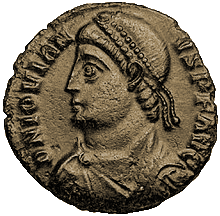Note of the Editor: Julian had designated a successor, Secundus Salutius, in case he prematurely died or was assassinated. When Julian was indeed assassinated, Salutius, who supported Greco-Roman culture, inexplicably rejected the purple that belonged to him according the Emperor’s will. And when the Christian Jovian was then chosen but soon died in an accident (as we will see in this post), the army offered once more the purple to the pagan Salutius and he rejected it again!
‘All that is necessary for the triumph of evil is that good men do nothing’.
______ 卐 ______
Jovian, Valentinian I and Valens
Although a ‘convinced Christian’, at the time of accessing the throne Jovian ordered to celebrate a sacrifice and consult the viscera. His first act of government was a shameful treaty with the Persians, in which he made great territorial concessions.
Very different from the ascetic Julian, the Catholic emperor Jovian, of mediocre culture although fond of playing being a patron, celebrated by the Church as ‘companion of the saints’, was lover of the wine, women and the celebrations. He restored the labarum as an imperial banner and not only murdered a senior notary of the same name, whom he feared as a possible candidate for the throne, but also deposed numerous civil and military officials among those named by Julian, confiscating their property and exiling them or executing them.

Solidus of emperor Jovian
According to Theodoret, these measures only affected those who had committed abuses against Christians or against the Christian Church. Jovian spared the life a certain Vindaonius Magnus, who had destroyed a ‘house of God’ in Berytus, in exchange for his paying for the reconstruction from his pocket. Paganism was not especially persecuted, even if one or another temple (such as that of Corfu) was closed or destroyed, sacrifices were forbidden or a library established by Julian in the temple of Trajan burned in Antioch (mainly because it contained anti-Christian works).
A little incapable, but obedient to the suggestions of the clergy, as soon as he stepped on Roman lands Jovian restored the privileges to the jubilant priests, in addition to giving them others that they did not have before. In the course of time they snatched many more. The exiled priests returned; the prelates crowded the court in droves, and even in the East the Nicene faith revived.
Saint Athanasius, distinguished by the emperor with an epistle and triumphantly received at Hierapolis, prophesied to Jovian in writing ‘a long and peaceful reign’—only eight months later, on February 17, 364, the emperor died in Dadastana (Bithynia), at the young age of thirty-one years, ‘beautifully prepared for death’, according to Theodoret, but actually intoxicated by a coal brazier. He was buried in the apostolic temple of Constantinople.
Again Second Salutius rejected the purple, reason why after hard discussions the dignitaries of the empire chose, at the end of February of the year 364, Valentinian, descendant of some farmers of Pannonia and son of the general Gratian. On March 28, in the field of Mars, the new emperor appointed co-regent for the eastern part of the empire his brother Valens, although he reserved for himself lapotior auctoritas.
It is from the time of Valentinian and Valens that the use of the word pagani was generalized to designate the adherents of the old religion.
Among the high positions of the army and of the administration the pagans still predominated, although for the last time and by the scarce majority of 12 to 10. In the part assigned to Valens, the payroll of the known officials gives us, along with nine polytheists, a Manichaean, three Arians and ten Orthodox. Many prestigious senators from Julian’s time and before left office, evidently because of their beliefs. In addition, the co-regulators enacted confiscations of temple properties (to incorporate them into their private funds), punishments against astrologers and threats of capital punishment for practitioners of night spells.
Both emperors were confessed Christians; it is even said that Valentinian had been retaliated for it in Julian’s time, while there is no similar incidence for Valens’ case. Both announced by decree (supposing it to be authentic) that ‘the Trinity is constituted by only one essence and three persons, the Father, the Son and the Holy Spirit, and we order that this is what everyone should believe…’
Soon, however, there were doctrinal differences between them and each one devoted himself to promoting his own. While Valentinian I, the emperor of the West, remained faithful to the Nicene Creed, Valens, who ‘had been orthodox at the beginning’ (Theodoret) promoted Arian beliefs in the East. In a certain way, it could be said that this is how the eternal rivalry between the East and the West was expressed. Both, and especially Valens, were quite uneducated; both were brutal, in particular Valentinian, and both had a deer-like panic of witchcraft.
After their proclamation, Valentinian and Valens travelled together through Thrace and Dacia, to separate in Sirmium.